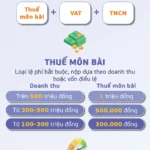In the program “Solving Queries about Electronic Invoicing and Taxation,” organized in collaboration with Vietnam Television (VTV), practical issues related to tax policies for business households were discussed.
A survey conducted by VTV with nearly 2,800 participants asked, “From 2026, if all business households are required to pay taxes based on actual income, what do you think?” Almost 50% responded that declaring and paying taxes, even for small businesses like selling vegetables or fish, is still cumbersome.
This is also a concern for many small business owners and traders, especially in community markets. Many people believe that declaring revenue is reasonable in principle, but it is necessary to consider actual profit levels and people’s access to technology and accounting practices.
Regarding this issue, Mr. Mai Son, Deputy Director of the Taxation Department (Ministry of Finance), shared: “In fact, issuing electronic invoices or paying taxes based on actual revenue brings benefits in terms of transparency and supports the development of more realistic policies. However, we also understand the difficulties faced by the people, especially those who have never had to deal with tax declaration or are not familiar with technology.”

Mr. Mai Son, Deputy Director of the Taxation Department (Ministry of Finance)
The tax authorities also stated that not all business households are required to pay taxes. Only those who reach the threshold of revenue as per the regulations need to declare and pay taxes.
For example, many small traders in community markets do not currently reach the threshold of one billion VND per year and are therefore not subject to tax payments or invoice issuance. For businesses that are actually taxable, the tax authorities will provide specific support, including sending officers to their premises to guide them through the declaration process instead of merely disseminating information through the media or social networks.
Additionally, there may be plans to implement additional tax agencies or declaration support services at reasonable fees to reduce the burden on micro-businesses. The authorities are also considering calculating taxes based not only on revenue but also on profit ratios to better reflect the reality of business operations.
Value-added tax will also be recalculated based on the principle of output minus input, and some industries have been granted preferential tax rates reduced from 10% to 8%. Regarding the concern about complex accounting practices when transitioning to an enterprise form, the tax department affirmed that the declaration mechanism would remain simple and almost identical to the current business household format.
Mr. Mai Son emphasized that the tax authorities would not only “encourage” business households to transition but would also create conditions for them to find the declaration and payment of taxes simple, accessible, and beneficial to themselves. This will also help the tax department develop more accurate policies based on transparent data and ensure fairness among different business groups in the market.
“Small Business Owners and Tax Queries: Do I Need to Issue Invoices for My Market Stall?”
As of 2026, the implementation of electronic invoicing and tax declaration based on actual revenue for businesses will be stricter. However, many individuals are unsure whether small-scale trading activities, such as selling a handful of vegetables or fish at the market, require mandatory declaration and invoicing.
“Issuing Invoices for 3,000 VND Noodle Packages: Why Not Simplify the Declaration Process? What’s the Tax Office’s Take on This?”
“On June 17, in an exclusive online interview session hosted by VnExpress, representatives from the Tax Department and related units addressed queries pertaining to tax policies for business households. The informative session aimed to provide much-needed clarity on tax-related matters, offering valuable insights to concerned citizens.”
The Tasty Turnover: How a Live Seafood Venture Reeled in Half-a-Billion Dong
As of December 2024, Vietnam’s Ministry of Finance reported a total of 3.6 million business households and individual business operators. This significant number showcases the thriving entrepreneurial spirit within the country, with a vast network of small businesses forming the backbone of Vietnam’s dynamic economy.
Why Are So Many Businesses Closing Down?
“A curious coincidence occurred as multiple businesses abruptly ceased trading, coinciding with a swift and comprehensive crackdown on illicit activities by enforcement agencies, targeting contraband, commercial fraud, and other violations.”











































